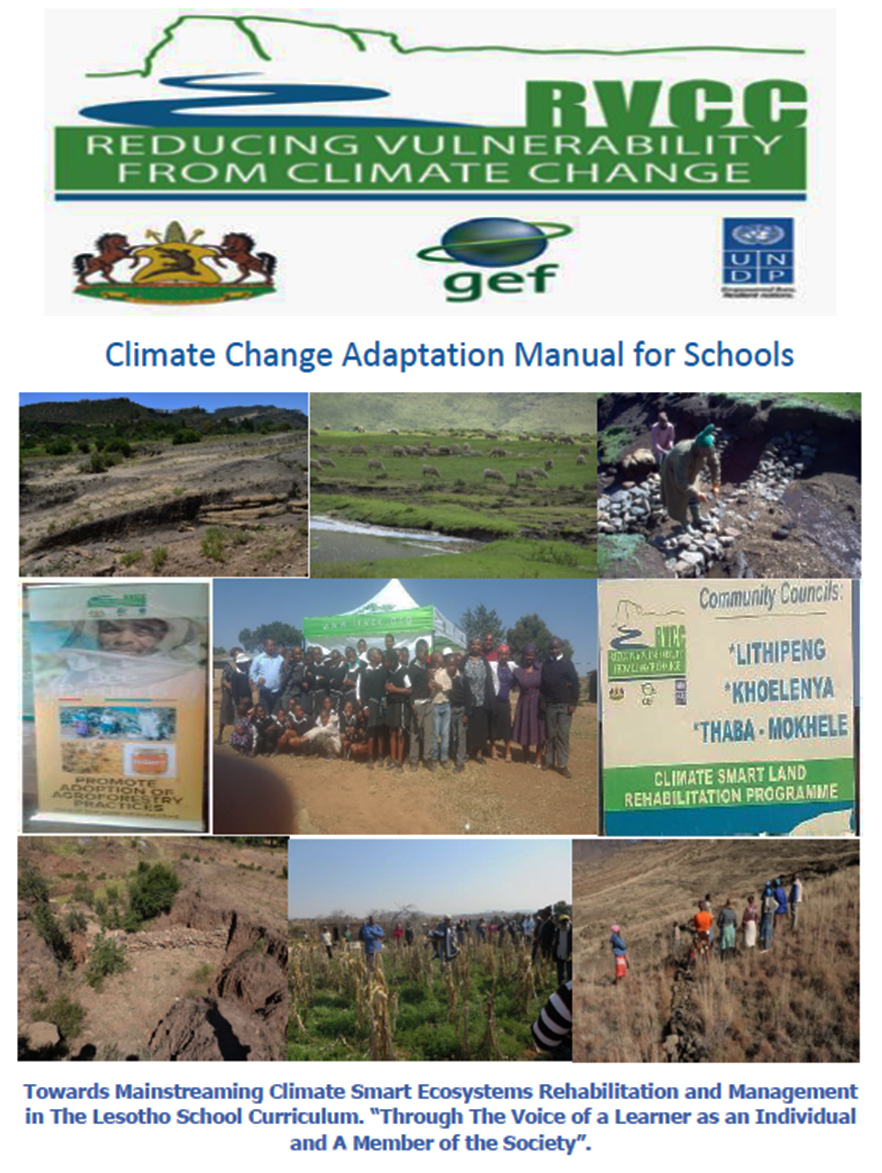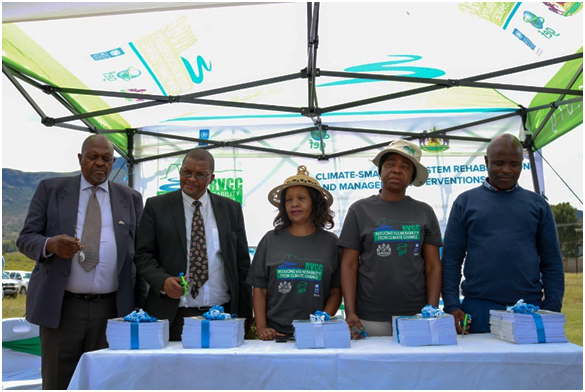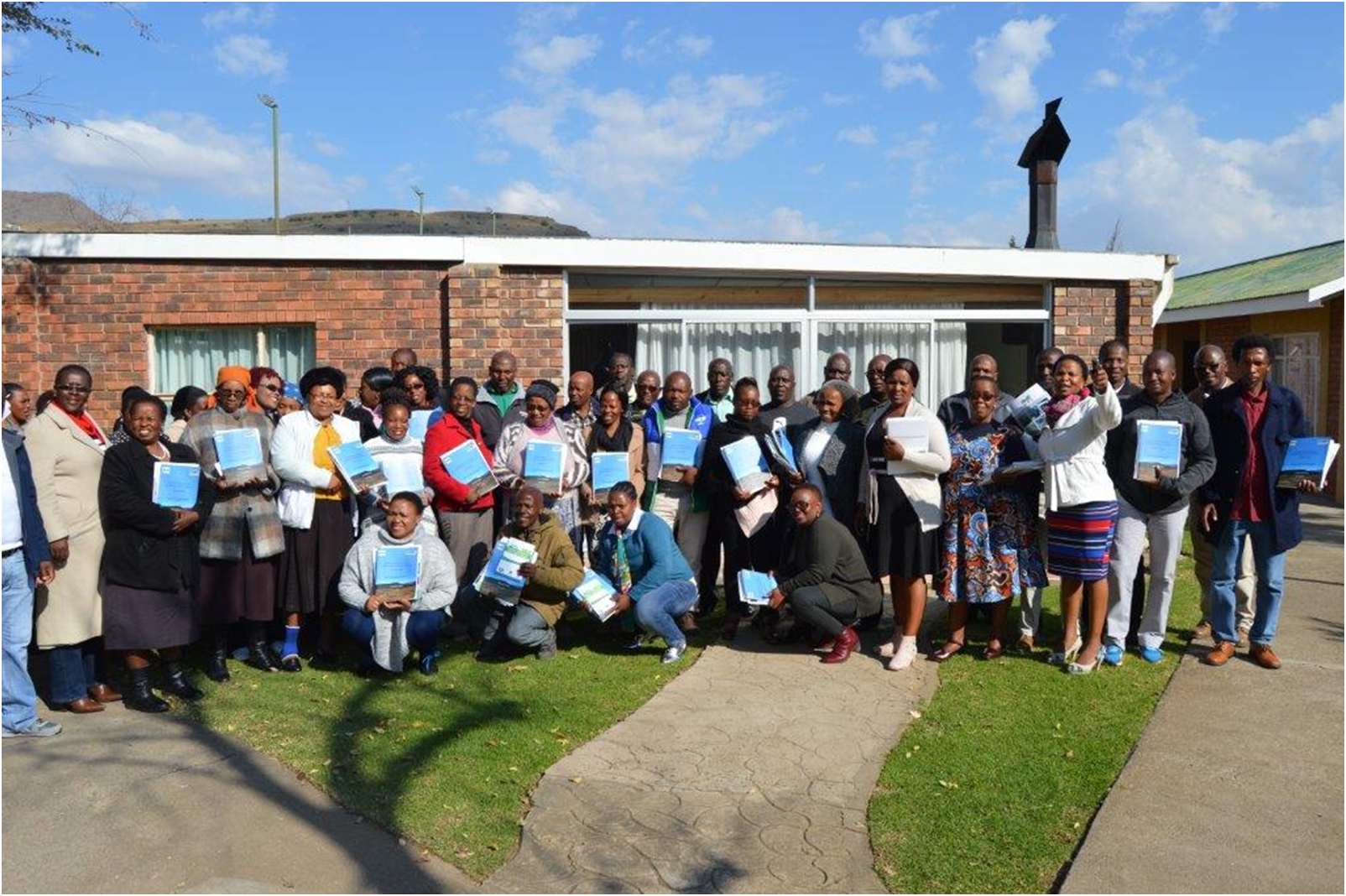 Mainstreaming Climate Change Adaptation in School Curricula in Lesotho
Reducing climate change vulnerability through awareness raising and the dissemination of ecosystem management adaptation measures in schools
Mainstreaming Climate Change Adaptation in School Curricula in Lesotho
Reducing climate change vulnerability through awareness raising and the dissemination of ecosystem management adaptation measures in schools

Challenges
Climate change is negatively affecting rural communities of Lesotho. While the country’s mountain ecosystems provide a range of benefits that can increase the resilience of such communities to climate change, these ecosystems are fragile and face widespread degradation as a result of unsustainable land management and exploitation of natural resources, which reduces their capacity to protect communities and their livelihoods.
Climate change adaptation in Lesotho faces multiple barriers, including:
- insufficient technical capacity and a limited information base for the analysis of climate risks;
- a low level of application of cutting-edge technologies in the planning and implementation of climate-smart ecosystem rehabilitation and management measures; and
- limited institutional and community awareness and knowledge of climate risks and adaptation measures.
Towards a Solution
To improve the climate change challenges facing Lesotho the Reducing Vulnerability from Climate Change in the Foothills, Lowlands and the Lower Senqu River Basin (RVCC) project was adopted to enhance the capacity of technical personnel to manage climate change risks and strengthen the resilience of vulnerable communities. This process involved, among other actions, changing mindsets. Therefore, it was critical to target future generations, in particular young people at schools.
The project was implemented by Lesotho’s Ministry of Forestry, Range and Soil Conservation and supported by the United Nations Development Programme (UNDP) and the Global Environment Facility (GEF). The project mainstreamed climate risk considerations in Lesotho’s Land Rehabilitation Programme. The goal was improved ecosystem resilience and reduced vulnerability of livelihoods to climate shocks.
One project activity was providing access to knowledge and training on adaptation using an ecosystem-management approach. After enhancing the technical capacities of the Ministry of Forestry, Range and Soil Conservation (MFRSC) and other relevant departments regarding the management of evolving climate-change risks and uncertainty, MFRSC and Ministry of Education officers partnered with a local NGO called Geography and Environment Movement to mobilize teachers and led a team that developed a climate change adaptation manual for schools.
A rapid assessment of available resources was done at the targeted schools. The assessment informed development of the training manuals and the provision of agricultural inputs, such as shade nets, drip-irrigation system kits and water-harvesting tanks, for practical applications (for example, crop production to complement a school feeding programme). The project facilitated a five-day training for the schoolteachers and a two-day training for pupils in five environmental thematic areas: climate change, rangeland management, soil conservation, water and agriculture.
The validation of the manual was followed by training of teachers, school board members, local authorities and learners from 27 schools. The launching of the manual reinforced the involvement of stakeholders in terms of awareness, capacity building and lifelong ownership, even beyond the lifespan of the project. In addition, before the launch, a meeting was held with senior officials from the ministries in charge of forestry and education and other line ministries and media briefs provided updates on the project’s progress and expected activities. This was another way of reinforcing the project’s ownership and sustainability measures. After the launch, a one-day workshop was held for principals, chiefs and their headmen as well as councillors for 27 beneficiary schools. The objective of the workshop was to inform member schools on how the project will intervene following material support and what is expected from them.
The climate change adaptation manual for schools has been adopted by the Ministry of Education and the National Curriculum Development Centre with the intention of rolling it out to the rest of the district and the country. This initiative is building on other initiatives, such as a school feeding programmes aimed at enhancing nutrition for pupils from disadvantaged communities through protected crop production. Furthermore, a newly launched GEF-funded project implemented in the Thaba Tseka, Mafeteng and Quthing Districts is replicating this initiative.
The activity has already reached 52 teachers and 1,170 students (538 males and 632 females) and the manual is still in use in 24 primary schools and three high schools. The launch of the manual at national and community council levels was a key event for raising climate change awareness and to draw technical support for climate change adaptation implementation; the launch was attended by 60 project partners and 413 students from three schools.
The impacts of climate changes in Africa are wide ranging and in many cases are the primary drivers of vulnerability and poverty. As countries across Africa take steps to fulfil their Nationally Determined Contributions to the Paris Agreement, it will be essential to mainstream, scale up and accelerate climate change adaptation initiatives across the continent through South-South Cooperation. Therefore, the mainstreaming solution in this project holds high potential for South-South cooperation with other African countries faced with the serious challenges of climate change. Potential South-South exchanges can start with countries next to Lesotho, such as Botswana, Mozambique, Namibia and South Africa, which experience similar climate change impacts and challenges. Such South-South exchanges on mainstreaming climate change adaptation approaches and management of climate risks can involve ministries of environment, education, other line ministries, NGOs and selected schools in those potential partner countries and can be further integrated into other ongoing climate change adaptation initiatives in those countries.
Contact Information
Countries involved
Supported by
Implementing Entities
Project Status
Project Period
Primary SDG
Secondary SDGs
Similar Solutions
| NAME OF SOLUTION | Countries | SDG | Project Status | |
|---|---|---|---|---|
Accelerator Labs Network Following collective intelligence methods to address emerging sustainability challenges and the growing demand for local solutions |
Lesotho | 08 - Decent Work and Economic Growth 13 - Climate Action | Ongoing | View Details |
Adaptation for Smallholder Agriculture Programme Establishing better working conditions for smallholder farmers through the use of good practices and new technologies |
Lesotho | 08 - Decent Work and Economic Growth 11 - Sustainable Cities and Communities 13 - Climate Action 15 - Life on Land | Ongoing | View Details |
African Agro-industry Inclusive Development through Bamboo Developing a green bamboo agro-industry for greater poverty alleviation and ecological protection in Rwanda |
Lesotho | 05 - Gender Equality 09 - Industry, Innovation and Infrastructure 13 - Climate Action 15 - Life on Land 17 - Partnerships for the Goals | --- | View Details |
Arab Women Leaders in Agriculture (AWLA) Fellowship Program Building female science power in the MENA region |
Lesotho | 02 - Zero Hunger 06 - Clean Water and Sanitation 13 - Climate Action 15 - Life on Land 17 - Partnerships for the Goals | Completed | View Details |
Asian-Pacific Network for Testing of Agricultural Machinery Developing harmonized regional standards for testing agricultural machinery |
Lesotho | 01 - No Poverty 08 - Decent Work and Economic Growth 12 - Responsible Consumption and Production 13 - Climate Action 15 - Life on Land 17 - Partnerships for the Goals | Completed | View Details |


